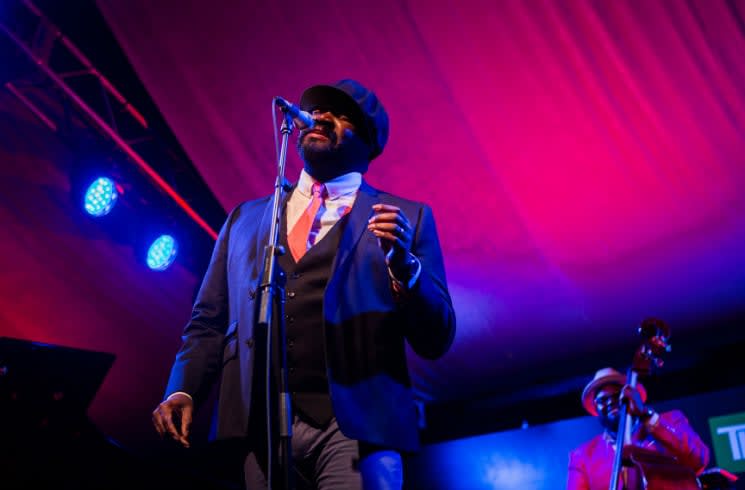One of the most eagerly anticipated shows of the Toronto Jazz Festival, Gregory Porter drew a capacity crowd to the big tent.
The audience was charmed by opening act Kandace Springs, giving her a rare standing ovation at the end of her short but sweet set. It was well earned too, as Springs demonstrated fluent piano playing and a warm stage presence that complemented her jazz-meets-soul style. She has oft been compared to Norah Jones, but Roberta Flack is a better reference point, as confirmed by her cover of "The First Time Ever I Saw Your Face."
A real air of excitement hung over the venue before Porter took to the stage. Bob Marley's "Could This Be Love" came over the PA, and the answer re: Porter would be a resounding yes. Without the help of any hype, in recent years Porter has become a Grammy-winning, million-selling vocalist hailed as one of the jazz world's most formidable talents. This performance certainly validated that claim.
Unconstrained by genre barriers, Porter roamed freely through jazz, gospel, R&B and soul. His powerful and deep voice is capable of real subtlety (he occasionally scatted), but he never over-sings or gets theatrical. He led off with one of his signature tunes, "Holding On" (a hit collaboration with Disclosure), one punctuated with some sizzling tenor sax work from Tivon Pennicott.
He followed that with "Let's Go To Harlem," a tune citing such inspirations as Langston Hughes and Marvin Gaye (a snippet of "What's Going On" drew cheers) that also showcased the jazz chops of Porter's four accompanists, with pianist Chip Crawford a particular standout. "Take Me to the Alley" also revealed Porter's strong social conscience, as on lines like "take me to the afflicted ones, the lonely ones that somehow lost their way."
Things got funkier with "Don't Lose Your Steam," while "Hey Laura" (another of his hits) showed he can tackle a tender '70s soul ballad with complete conviction. With another graceful pivot, he launched into the gospel fervour of "Liquid Spirit," a number that had the crowd clapping along enthusiastically.
A stunning highlight of the night was an extended 15-minute-plus version of "Musical Genocide," Porter's powerful finger-pointing at the record business. Inserts of Marley's "Jamming" and "Papa Was a Rolling Stone" were followed by name-checking of more of his black musical heroes, from Coltrane to Sam Cooke and Earth Wind and Fire, all with the fiery accompaniment of his group.
The mood then dramatically shifted to the tender ballads "Wolfcry" (voice and piano only) and "Insanity," then back again to the pointed political commentary of "1960 What?" Strongly evocative of Gil Scott-Heron, it was written by Porter's early mentor, Kamau Kenyatta, and provided a fitting closer to a stunning performance that will linger long in the memory bank.
The audience was charmed by opening act Kandace Springs, giving her a rare standing ovation at the end of her short but sweet set. It was well earned too, as Springs demonstrated fluent piano playing and a warm stage presence that complemented her jazz-meets-soul style. She has oft been compared to Norah Jones, but Roberta Flack is a better reference point, as confirmed by her cover of "The First Time Ever I Saw Your Face."
A real air of excitement hung over the venue before Porter took to the stage. Bob Marley's "Could This Be Love" came over the PA, and the answer re: Porter would be a resounding yes. Without the help of any hype, in recent years Porter has become a Grammy-winning, million-selling vocalist hailed as one of the jazz world's most formidable talents. This performance certainly validated that claim.
Unconstrained by genre barriers, Porter roamed freely through jazz, gospel, R&B and soul. His powerful and deep voice is capable of real subtlety (he occasionally scatted), but he never over-sings or gets theatrical. He led off with one of his signature tunes, "Holding On" (a hit collaboration with Disclosure), one punctuated with some sizzling tenor sax work from Tivon Pennicott.
He followed that with "Let's Go To Harlem," a tune citing such inspirations as Langston Hughes and Marvin Gaye (a snippet of "What's Going On" drew cheers) that also showcased the jazz chops of Porter's four accompanists, with pianist Chip Crawford a particular standout. "Take Me to the Alley" also revealed Porter's strong social conscience, as on lines like "take me to the afflicted ones, the lonely ones that somehow lost their way."
Things got funkier with "Don't Lose Your Steam," while "Hey Laura" (another of his hits) showed he can tackle a tender '70s soul ballad with complete conviction. With another graceful pivot, he launched into the gospel fervour of "Liquid Spirit," a number that had the crowd clapping along enthusiastically.
A stunning highlight of the night was an extended 15-minute-plus version of "Musical Genocide," Porter's powerful finger-pointing at the record business. Inserts of Marley's "Jamming" and "Papa Was a Rolling Stone" were followed by name-checking of more of his black musical heroes, from Coltrane to Sam Cooke and Earth Wind and Fire, all with the fiery accompaniment of his group.
The mood then dramatically shifted to the tender ballads "Wolfcry" (voice and piano only) and "Insanity," then back again to the pointed political commentary of "1960 What?" Strongly evocative of Gil Scott-Heron, it was written by Porter's early mentor, Kamau Kenyatta, and provided a fitting closer to a stunning performance that will linger long in the memory bank.




